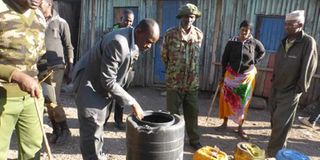Alcoholism is ‘our’ problem

Security officials inspect containers used to store illicit brews during a raid by police in Isiolo market on September 7, 2016.
Desmond Tutu said there come a time when we need to stop just pulling people out of the river and instead go upstream and find out why they are falling in.
This is the case with the alarming prevalence of alcoholism in Kenya, particularly the consumption of illicit brew.
Banning and pouring of second-and third-generation alcoholic beverages has been done time and again. Illegal brewers have been arrested and laws to regulate bar operation hours put in place, but that has not yielded fruit. The youth are the most affected cohort with indulgence primarily blamed on unemployment and underemployment.
Whose responsibility is it to save this generation from the insidious poison? Enforcement of drinking laws is damage control; we need to go back to the trigger.
There is, however, no elaborate quick-fix solution. The alcoholics are the primary enablers of the trade of cheap liquor. Production would decline if there wasn’t a market for it. The vendors have had their role but we need to point fingers elsewhere: The addict, their immediate family and society.
Collective responsibility and accountability might be the measure to serve long-term alcoholism control.
A Stanford University study whose report was published in Cochrane Reviews in 2020 showed that Alcoholics Anonymous (AA) groups achieved more success in managing alcoholism than individual therapy.
The programme has more than two million members spread over 118,000 support groups in 180 nations, Kenya included. Founded by Dr Bob Smith in the US in the 1930s, AA’s meetings in Kenya are held in Nairobi and its environs with groups in Mombasa, Kisumu and Kiambu counties.
On alcoholism, make the programme extensive, modify it to suit the needs of our diverse communities and give holistic support to the recovery groups.
Ms Hinga is a microbiologist and creative writer. [email protected].





